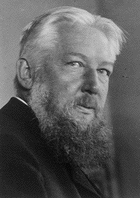Wilhelm Ostwald
Ostwald, Wilhelm
Wilhelm Ostwald (1853–1932), a German physical chemist, received the 1909 Nobel Prize in Chemistry for his work on catalysis and his investigations into the fundamental principles governing equilibrium and rates of reaction. Ostwald translated Josiah Willard Gibbs' works from English into German in 1892 and founded one of the first journals of physical chemistry with Jacobus van 't Hoff (1852-1911), a Dutch chemist. He also incorporated thermodynamics into a general theory of economic development. In 1907, Ostwald stated that energy was the ‘sole universal generalization’ because it possesses the principle of conservation under all circumstances. Based on this principle, Ostwald sketched the beginnings of civilization in energy terms. He believed that if culture is a means by which humans control their natural environment, and if all events are at root energy transformations, then civilization becomes a history of ever-increasing control of energy for human purposes. Civilization advanced through energy transitions, as new and better ways were devised to enhance human labor with inanimate energy sources.
